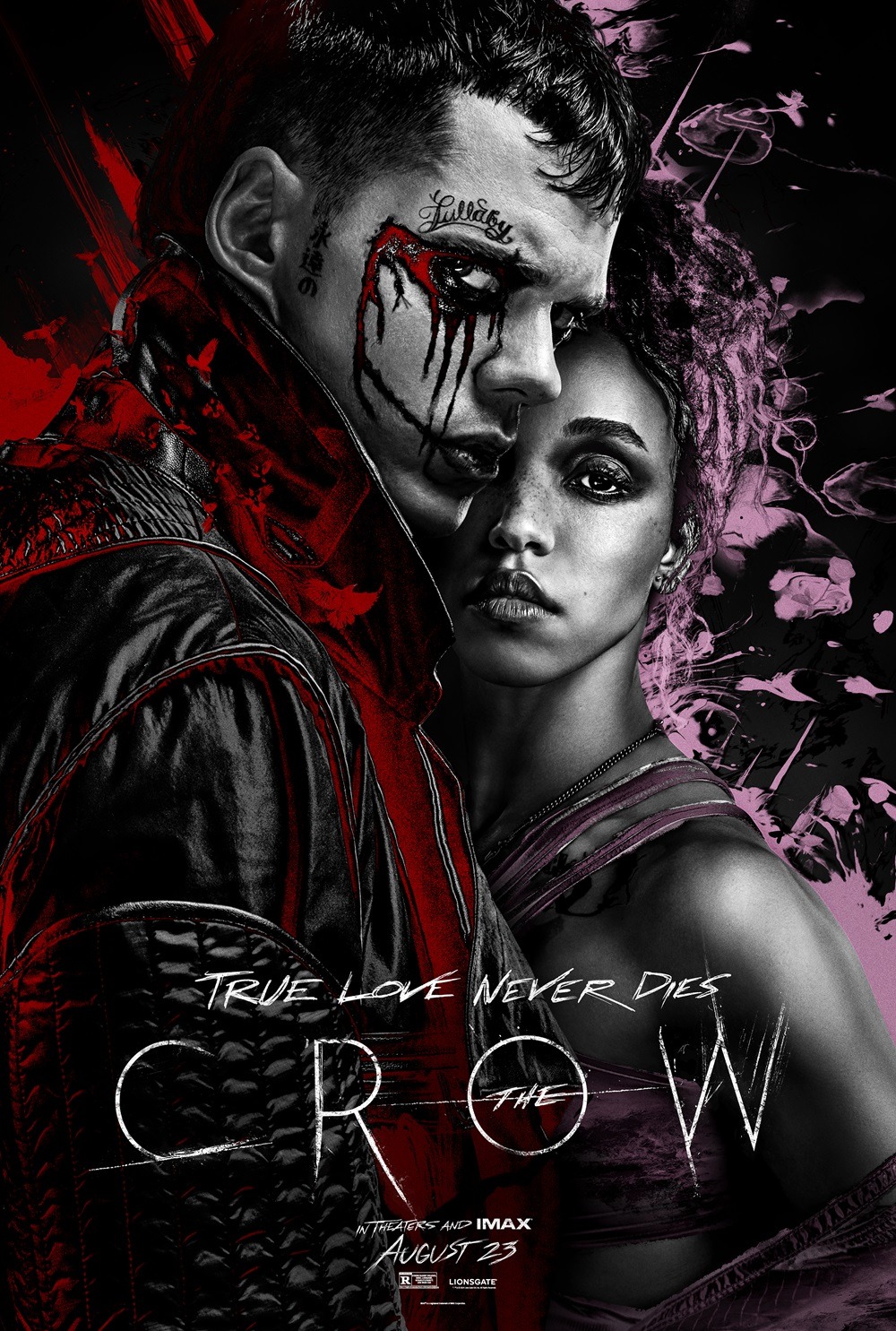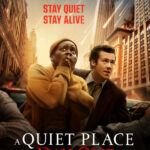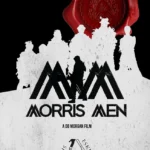Director
Rupert Sanders
Starring
Bill Skarsgård
FKA Twigs
Danny Huston
Sami Bouajila
From the outset The Crow distinguishes itself from the 1994 original in that the two ill-fated leads, Eric [Skarsgård] and Shelly [Twigs], aren’t an established couple. Instead, Eric is trapped in a rehab centre, unable to open up about his experiences with death. And Shelly is on the run, pursued by a powerful mogul named Roeg [Huston], due to her inside knowledge of a crime – making her a witness that could bring about his downfall. Eric and Shelly quickly fall for one another but Shelly’s past catches up to them, and both are murdered. But while Shelly’s soul is damned, Eric’s love for her allows him to return and exact revenge upon those who brought about this tragedy.
One could argue, aside from the financial potential through nostalgic manipulation, the sole opportunity of a remake is to improve upon the decisions made in a past release. But what does it say when every change is a step down in quality? Every adjustment weakening the structure and established order that made the original so beloved? Well, what you end up with is this iteration of The Crow becoming another grim entry in a franchise which has been plagued by death, butchered edits from studios, and incredibly lacklustre sequels. If it needed saying, 1994’s The Crow is a truly iconic cult film, and one which was incredibly formative for a lot of people. Moreover, it felt unique in its presentation, rich gothic tone, and desperately morose tragic drive. Yes, it’s replete with a ‘cool’ factor, some playful mirth, action set pieces, and a grim-dark comic book setting, but the underlying mood is one of sorrow. And I highlight this because that’s one of the most absent components in this interpretation.
This version of The Crow is fuelled by rage and excessive brutality. To the degree that the acts of violence feel egregious and celebratory, less like those of a spirit of vengeance consumed by love and misery. Case in point, one of the peak confrontations takes place during a performance at an opera house. And while opera during violent fight scenes can work wonders, this felt like a poor match. The close-up savagery is ferocious and bloody but doesn’t convey the devastation beneath the surface. There’s little soul to Eric, he’s simply an agent of death. Which, isn’t something that can’t be explored, but when it’s executed in this manner, it feels more like an excuse to justify acts he already wanted to perform.
And therein lies the problem. We don’t understand this couple. Through a few montages, it’s evident they care for one another and have formed a brief Romeo and Juliet style bond, but the rushed and forced circumstance of their meeting, leaves the Eric/Shelly dynamic cold. I don’t dislike more of an exploration of Shelly as a person (rather than a two dimensional trophy to be avenged), but this feels at odds with the calamity that befalls them. To explain, the charming tragedy of almost every version of The Crow is that Eric and Shelley were collateral damage, completely oblivious to the underworld around them, but entirely victims of it. They are literal innocents who are struck down by evil, and Eric returns to haunt those who brought this about. Not simply to physically punish them, but to make them empathise and understand how their actions have ruined lives. Especially as the underlying statement that revenge should resonate as hollow, even when you attain it, should be at this movie’s core.
Which brings us to the villain of the piece. Roeg is a ridiculous inclusion and is never really explained. See, while Eric is touched by mystical powers from beyond the grave, Roeg is also a supernatural element. Sure, he’s a ruthless and powerful business person (the details of which are fairly scant and unimportant) and he commands a great deal of respect and influence. And while setting up a juxtaposition between those trying to etch out a life at the bottom of the fiscal food chain and the 1% isn’t a poor decision, making Roeg a being who has survived several lifetimes by whispering into people’s ears and causing them to commit acts which sends their souls to hell on his behalf, is spectacularly half-baked. Part of the allure of The Crow is setting people with earthly sway and dominion against a supernatural force. It’s the inversion of that power dynamic, and how it terrifies those who have exploited that position of control and authority. So, to make your key adversary someone who also has paranormal powers, cheapens the lesson and confrontation. Especially when audiences are given no concrete answers or exposition as to who this man is, what motivates him, and what he is truly capable of.
What’s most interesting to me, however, is that this is a Rupert Sanders production. Despite having only previously directed two features, he had already carved a very strong visual presence into each of his movies. Yet, bafflingly, Sanders’ usual visual flare feels neutered. Granted, the cinematography and production design are pleasing, but they come off as far too grounded for what should be a heightened story about this strange figure who walks between worlds. And that’s not to say they simply should have replicated the gothic setting of the original film (or any of the sequels for that matter), there’s nothing wrong with rooting this version in a more realistic setting, but this unnamed city feels hollow and generic, save for the frankly bizarre rehab facility at the start of the film which operates as clinic, prison and military compound.
Even taking this movie at face value, based on the assumption that this is your first foray into the franchise, so many elements at work are subpar. To the degree that effort is clearly on display but with an underlying sense of defeatism. Almost as if, at every stage of the production, everyone was aware this wasn’t going to work. Granted, they performed their role as best as possible, but the foundation is so weak that this movie was essentially declared dead on arrival.
Release Date:
23 August 2024
The Scene To Look Out For:
Midway through the film, Eric visits Shelly’s mother and confronts her about her involvement with Roeg and how she abandoned Shelly. Again, through poor scripting and mismanaged editing, it’s never clear what the overall relationship between Shelly, her mother and Roeg is. There’s a sense that Shelly’s mother sold her daughter out to ensure a better life for herself. But that’s never explicitly detailed, meaning we don’t understand what that manifests as. Are we talking about money, influence, dominance over others? She has a nice apartment, but that’s about it. And this scene is then immediately undercut by a very rushed, somewhat manic sense of regret. It’s just a bit of a mess.
Notable Characters:
One character I didn’t mention is Kronos, played by Sami Bouajila. Acting as an intermediary between this world and the hereafter, he guides Eric and instructs him. But only in the most minimal sense and is little more than a shocking waste on an already underrated actor.
Highlighted Quote:
“I can’t tell you. If I did, you’d leave me. And if you leave me, I’d die”
In A Few Words:
“A remake with little understanding of the motivation behind the source material, bringing no extra value to an already stone cold classic.”
Total Score: 1/5

![The Red Right Hand Movie Reviews [Matthew Stogdon]](https://reviews.theredrighthand.co.uk/wp-content/uploads/2021/12/cropped-header1.png)



